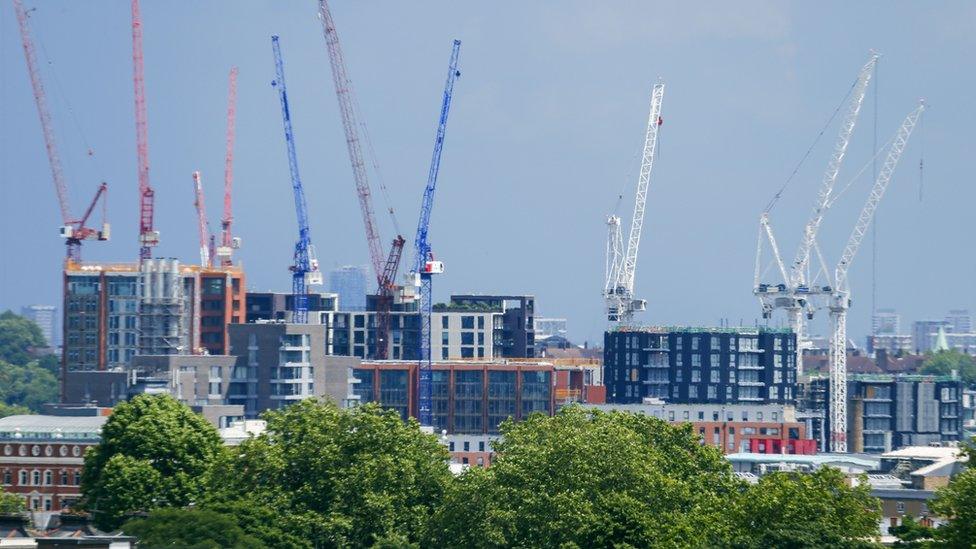The economic bounce back
- Published
- comments

The number of cranes that pepper the skyline is a useful indicator of economic activity.
The more cranes there are, the more construction work is going on.
In 2013 a study by the Health and Safety Executive (which oversees the erection of tower cranes) revealed that 60% of them went up in London, despite the city only having 1 in 8 of the population.
The figures showed that the capital was the economic powerhouse of the UK. And that construction mattered.
Today's construction figures are far from gloomy.
They suggest that over the next year we could be seeing far more cranes as business confidence returns after the concerns of the referendum result.
IHS Markit, which publishes the data, said there was evidence of "a renewed rise in staffing levels across the construction sector and a rebound in business expectations for the next 12 months".
Pendulum sentiment
Yesterday's manufacturing figures were also far more positive than many expected.
What we are seeing at the moment is classic pendulum sentiment.
As the referendum approached, companies delayed investment and sat in "wait and see mode".
Gloom was the order of the day.
Figures such as the Purchasing Managers' Indices - which the manufacturing and construction figures are - were badly affected.
July's construction PMIs were the worst for seven years.
Now, there is a different mood. The sky has not fallen in and the UK finds itself in something of a goldilocks scenario.
Weaker pound
The country is still a member of the European Union single market - with all the economic advantages that confers.
And will be probably well into 2019 at least.
At the same time, as far as many exporting businesses are concerned, the country has received an economic boost with a relatively rapid devaluation in sterling.
Trading in a single market with a weak currency certainly has plenty of economic upside.
Of course, consumers may not see it in quite the same way as businesses.
If you are travelling abroad, a weaker pound is not good news.
And the import prices of food, energy and manufactured goods will be higher.
As Sir Rupert Pennant-Rea, the former deputy governor of the Bank of England, put it, "indirectly all Britons go abroad every day" when they buy imported groceries and fill up their cars with imported fuel.
There are likely to be inflationary consequences, and the construction PMIs today do note "a further steep acceleration in input cost inflation".
Interest rates
The Bank of England will be watching these inflation effects closely.
With last month's cut in interest rates, the Monetary Policy Committee of the Bank indicated that it was more concerned about a fall in economic growth than it was about inflationary pressures.
That calculation may change if the PMIs we have seen over the last 24 hours are not just a reaction to the previous month's poor figures, but actually signal a return of business confidence and activity.
If inflation starts rising at the same time, then the further interest rate cut to 0.1% Mark Carney signalled last month may not materialise.
On Monday, the services PMI will be scrutinized carefully.
That sector includes retail and banking and makes up by far the largest part of the UK economy.
Yes, cranes are important.
But what consumers spend in the shops is far more significant.